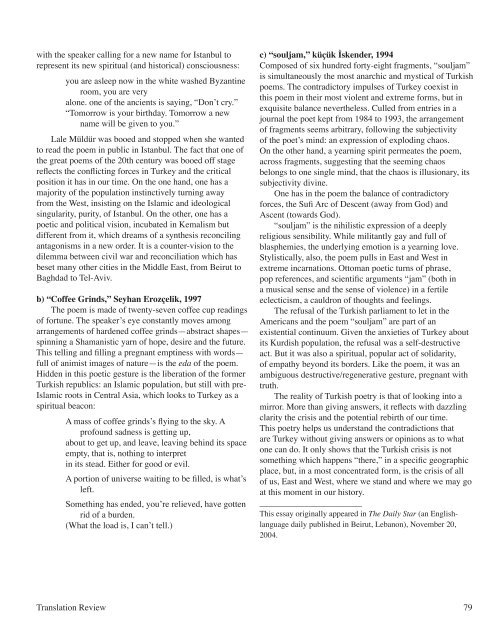Translation Review - The University of Texas at Dallas
Translation Review - The University of Texas at Dallas
Translation Review - The University of Texas at Dallas
Create successful ePaper yourself
Turn your PDF publications into a flip-book with our unique Google optimized e-Paper software.
with the speaker calling for a new name for Istanbul to<br />
represent its new spiritual (and historical) consciousness:<br />
you are asleep now in the white washed Byzantine<br />
room, you are very<br />
alone. one <strong>of</strong> the ancients is saying, “Donʼt cry.”<br />
“Tomorrow is your birthday. Tomorrow a new<br />
name will be given to you.”<br />
Lale Müldür was booed and stopped when she wanted<br />
to read the poem in public in Istanbul. <strong>The</strong> fact th<strong>at</strong> one <strong>of</strong><br />
the gre<strong>at</strong> poems <strong>of</strong> the 20th century was booed <strong>of</strong>f stage<br />
refl ects the confl icting forces in Turkey and the critical<br />
position it has in our time. On the one hand, one has a<br />
majority <strong>of</strong> the popul<strong>at</strong>ion instinctively turning away<br />
from the West, insisting on the Islamic and ideological<br />
singularity, purity, <strong>of</strong> Istanbul. On the other, one has a<br />
poetic and political vision, incub<strong>at</strong>ed in Kemalism but<br />
different from it, which dreams <strong>of</strong> a synthesis reconciling<br />
antagonisms in a new order. It is a counter-vision to the<br />
dilemma between civil war and reconcili<strong>at</strong>ion which has<br />
beset many other cities in the Middle East, from Beirut to<br />
Baghdad to Tel-Aviv.<br />
b) “C<strong>of</strong>fee Grinds,” Seyhan Erozçelik, 1997<br />
<strong>The</strong> poem is made <strong>of</strong> twenty-seven c<strong>of</strong>fee cup readings<br />
<strong>of</strong> fortune. <strong>The</strong> speakerʼs eye constantly moves among<br />
arrangements <strong>of</strong> hardened c<strong>of</strong>fee grinds—abstract shapes—<br />
spinning a Shamanistic yarn <strong>of</strong> hope, desire and the future.<br />
This telling and fi lling a pregnant emptiness with words—<br />
full <strong>of</strong> animist images <strong>of</strong> n<strong>at</strong>ure—is the eda <strong>of</strong> the poem.<br />
Hidden in this poetic gesture is the liber<strong>at</strong>ion <strong>of</strong> the former<br />
Turkish republics: an Islamic popul<strong>at</strong>ion, but still with pre-<br />
Islamic roots in Central Asia, which looks to Turkey as a<br />
spiritual beacon:<br />
A mass <strong>of</strong> c<strong>of</strong>fee grindsʼs fl ying to the sky. A<br />
pr<strong>of</strong>ound sadness is getting up,<br />
about to get up, and leave, leaving behind its space<br />
empty, th<strong>at</strong> is, nothing to interpret<br />
in its stead. Either for good or evil.<br />
A portion <strong>of</strong> universe waiting to be fi lled, is wh<strong>at</strong>ʼs<br />
left.<br />
Something has ended, youʼre relieved, have gotten<br />
rid <strong>of</strong> a burden.<br />
(Wh<strong>at</strong> the load is, I canʼt tell.)<br />
c) “souljam,” küçük İskender, 1994<br />
Composed <strong>of</strong> six hundred forty-eight fragments, “souljam”<br />
is simultaneously the most anarchic and mystical <strong>of</strong> Turkish<br />
poems. <strong>The</strong> contradictory impulses <strong>of</strong> Turkey coexist in<br />
this poem in their most violent and extreme forms, but in<br />
exquisite balance nevertheless. Culled from entries in a<br />
journal the poet kept from 1984 to 1993, the arrangement<br />
<strong>of</strong> fragments seems arbitrary, following the subjectivity<br />
<strong>of</strong> the poetʼs mind: an expression <strong>of</strong> exploding chaos.<br />
On the other hand, a yearning spirit perme<strong>at</strong>es the poem,<br />
across fragments, suggesting th<strong>at</strong> the seeming chaos<br />
belongs to one single mind, th<strong>at</strong> the chaos is illusionary, its<br />
subjectivity divine.<br />
One has in the poem the balance <strong>of</strong> contradictory<br />
forces, the Sufi Arc <strong>of</strong> Descent (away from God) and<br />
Ascent (towards God).<br />
“souljam” is the nihilistic expression <strong>of</strong> a deeply<br />
religious sensibility. While militantly gay and full <strong>of</strong><br />
blasphemies, the underlying emotion is a yearning love.<br />
Stylistically, also, the poem pulls in East and West in<br />
extreme incarn<strong>at</strong>ions. Ottoman poetic turns <strong>of</strong> phrase,<br />
pop references, and scientifi c arguments “jam” (both in<br />
a musical sense and the sense <strong>of</strong> violence) in a fertile<br />
eclecticism, a cauldron <strong>of</strong> thoughts and feelings.<br />
<strong>The</strong> refusal <strong>of</strong> the Turkish parliament to let in the<br />
Americans and the poem “souljam” are part <strong>of</strong> an<br />
existential continuum. Given the anxieties <strong>of</strong> Turkey about<br />
its Kurdish popul<strong>at</strong>ion, the refusal was a self-destructive<br />
act. But it was also a spiritual, popular act <strong>of</strong> solidarity,<br />
<strong>of</strong> emp<strong>at</strong>hy beyond its borders. Like the poem, it was an<br />
ambiguous destructive/regener<strong>at</strong>ive gesture, pregnant with<br />
truth.<br />
<strong>The</strong> reality <strong>of</strong> Turkish poetry is th<strong>at</strong> <strong>of</strong> looking into a<br />
mirror. More than giving answers, it refl ects with dazzling<br />
clarity the crisis and the potential rebirth <strong>of</strong> our time.<br />
This poetry helps us understand the contradictions th<strong>at</strong><br />
are Turkey without giving answers or opinions as to wh<strong>at</strong><br />
one can do. It only shows th<strong>at</strong> the Turkish crisis is not<br />
something which happens “there,” in a specifi c geographic<br />
place, but, in a most concentr<strong>at</strong>ed form, is the crisis <strong>of</strong> all<br />
<strong>of</strong> us, East and West, where we stand and where we may go<br />
<strong>at</strong> this moment in our history.<br />
_______________________<br />
This essay originally appeared in <strong>The</strong> Daily Star (an Englishlanguage<br />
daily published in Beirut, Lebanon), November 20,<br />
2004.<br />
<strong>Transl<strong>at</strong>ion</strong> <strong>Review</strong> 79

















